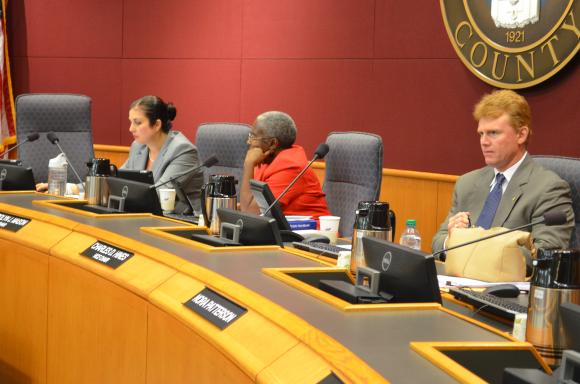In his June 26, 2014 column for Investors Business Daily, titled “Revisionists Have A Field Day On Why We Invaded Iraq,” writer Victor Davis Hanson exposed much of the revisionism that is now occurring as Democrats lay the groundwork for a Hillary Clinton presidential run in 2016.
Liberals and Democrats continue to lay the blame for the Iraq War at the feet of George Bush and Dick Cheney. So, instead of buying into leftist election season propaganda, it’s time we set the record straight. Let’s look at the facts. A 2002 Bush White House document, titled “Saddam Hussein’s Defiance of United Nations Resolutions,” reviewed the outcome of U.N. Security Council resolutions, stating that, “Saddam Hussein has repeatedly violated sixteen United Nations Security Council Resolutions (UNSCRs) designed to ensure that Iraq does not pose a threat to international peace and security.”
The document went on to detail each of those sixteen Security Council resolutions. However, when it became clear that Saddam Hussein had not fully complied with the substance of these resolutions by November 8, 2002, the Security Council adopted, unanimously, Resolution 1441, a “final opportunity” for Saddam to comply with his disarmament obligations.
Hanson points out that, “Prior to our invasion, the Kurds (in northern Iraq) were a persecuted people who had been gassed (with WMD), slaughtered, and robbed of all rights by Saddam. He reminds us that, in 2003, the New York Times estimated that Saddam Hussein had killed as many as 1 million of his own people… translating to about 40,000 deaths for each year he led Iraq…”
Hanson tells us that George Bush’s 2007-08 “surge” ended much of the violence. By Obama’s second year in office, American fatalities were reduced to far less than the monthly accident rate in the U.S. military… a record which Obama referred to as “an extraordinary achievement,” leading to a “stable” and “self-reliant” Iraq… which he inherited and later abandoned.
Resolution 1441 stated that Iraq was in “material breach” of the ceasefire terms presented under the terms of Resolution 687. U.N. inspectors were allowed to reenter Iraq and on December 19, 2002, the U.N. chief inspector, Hans Blix, reported that the Iraqis had made “false statements or omissions in the declarations submitted by Iraq pursuant to (Resolution 1441) and failure by Iraq at any time to comply with, and cooperate fully in the implementation of this resolution shall constitute a further material breach of Iraq’s obligations.”
In anticipation of the report by U.N. inspectors, coalition forces of more than 30 countries, led by the United States and Great Britain, continued to deploy in Kuwait, Saudi Arabia, and elsewhere in the Middle East. It was during this period of time that the Bush administration requested the necessary war powers from the U.S. Congress.
The Iraq war powers act, P.L. 107-243, passed the Republican-controlled House on October 10, 2002, by a vote of 296-133, and the Democrat-controlled Senate on October 11 by a vote of 77-23. Twenty-eight Democrats, including Senators Clinton, Kerry, and Biden, voted in favor of the proposal. Finally, on March 20, 2003, with all coalition forces in position, the invasion of Iraq commenced. That represents the conventional wisdom, the “cover story,” which liberals and Democrats continue to use to try to convince the American people that George Bush and Dick Cheney lied to launch the Iraq War. But there is much more to the story.
In early March 1990, I received a telephone call from my friend Chuck de Caro. He was calling from Tucson to say that he needed my help. Chuck was a former special assignments reporter for CNN. In that capacity he received many of the most dangerous foreign assignments. During the Nicaraguan civil war, he parachuted into the Nicaraguan jungles to live with Contra guerilla forces for weeks at a time… eating snakes, rodents, and other jungle varmints and bringing out dramatic news film of guerilla engagements.
Then, during the 1983 U.S. invasion of Grenada, when Ronald Reagan sent American troops to rescue American medical students trapped when communist forces took control of the island, Chuck was the first American newsman to break the news embargo on the battle zone. At one point, as he “ate dirt,” lying flat on his face in the no-man’s-land between U.S. and Cuban ground forces, he concluded that there had to be a better way of covering such conflicts.
I first met Chuck in 1987 when I worked as a consultant to the American Foreign Policy Council in Washington. During the months that I shared a beautiful estate in Great Falls, Virginia, Chuck occupied an RV parked in the woods behind our garage, developing a concept of Information Warfare called SOFTWAR, the centerpiece of which was a Lockheed L-188C Electra aircraft with “long legs” fuel capacity, and with a network-quality newsroom built inside the fuselage. He spent the next three years promoting his SOFTWAR concept to the major networks and finding the necessary funding for the project. His telephone call in March 1990 was to tell me that he had his flying newsroom nearly completed and that he needed my help to complete it.

C-130 COMMANDO SOLO-II aircraft.
When fully equipped, the aircraft featured side-looking, forward-looking, and rear-looking gyro-stabilized, FLIR zoom-lens color TV cameras; side-looking airborne radar (SLAR) with a range of 100 miles on either side of the aircraft; a gyro-stabilized KU-band satellite up-link and C-band down-link; five redundant radio-telephone transmission systems; two complete edit stations, and two remotely piloted drones… small unmanned aerial vehicles (UAVs) equipped with gyro-stabilized color TV cameras that could be flown over distant venues, any place where it was too dangerous for humans to go. Aerobureau-One was the most sophisticated communications aircraft in the world. No one had anything like it, not even the U.S. Air Force with their C-130 COMMANDO SOLO-II aircraft.
Unfortunately, the major networks were in the process of shrinking their international footprint, so Aerobureau-One went into mothball status in Canada. It was not until the summer of 2002, twelve years later, when the Republican-controlled House Permanent Select Committee on Intelligence (HPSCI) decided that de Caro’s SOFTWAR concept was the perfect solution for deposing Saddam Hussein without the necessity of putting “boots on the ground” in Iraq.
Under the theory that no dictator can remain a dictator unless his people believe him to be both omnipotent and omniscient, HPSCI authorized the necessary funding for an intense Information Warfare campaign designed to remove one or both of those advantages from Saddam Hussein… thereby hastening the day when he would be overthrown by his own people. Saddam’s ability to communicate with the Iraqi people via radio and television would be fully degraded by U.S. air power and replaced with radio and TV transmissions from a coalition broadcast platform, our Aerobureau-One aircraft, stationed in either Kuwait or Turkey.
However, the U.S. Senate, comprised of 50 Republicans and 50 Democrats, changed from Republican to Democrat control when Sen. Jim Jeffords (R-VT) left the Republican Party to become an Independent, aligning himself with senate Democrats. As a result, when the HPSCI authorization arrived in the U.S. Senate as a supplement to the 2002-03 Defense Appropriations bill, senate Democrats decided that it was more important for them to have a political issue to use against George W. Bush in his 2004 reelection campaign than to avert a ground war in Iraq.
In early September 2002, de Caro called to say that the HPSCI authorization was stalled in the U.S. Senate and that he needed the assistance of an experienced lobbyist to help convince senate Democrats to stop playing politics with the impending invasion. I arrived in the Washington, DC area on September 9 and we began immediately to map out our lobbying strategy.
On September 12, we spent our first full day in the U.S. Senate, briefing aides to Senators Jay Rockefeller (D-WV) chairman of the Senate Select Committee on Intelligence, Senator Dick Shelby (R-AL) vice chairman of the Senate Select Committee on Intelligence, and Senator John Warner (R-VA) the ranking Republican on the Senate Armed Services Committee. In the days and weeks that followed we received solid support from senior Senate staffers, but their interests and the interests of the Democratic senators they served were clearly not in sync.
While Democrats made impassioned speeches on the floor of the senate, insisting that the Congress could not give George W. Bush the war powers he sought, and that a way had to be found to remove Saddam Hussein through non-violent means, they were busy in the Capitol basement instructing the staff of the Senate Appropriations Committee to kill the HPSCI SOFTWAR authorization… our last best hope of averting a ground war in Iraq.
de Caro and I spent most of September and October 2002 attempting to get senate Democrats to authorize and fund the SOFTWAR initiative, but to no avail. And when we asked that they fund the project for a single dollar, just to get it “in the pipeline,” with supplemental funding to be added during the 108th Congress, they refused even that. They wanted an issue to use against George Bush, even if it meant ignoring a non-violent means of averting a ground war in Iraq.
In that war, some 4,500 American men and women, and countless Iraqis, paid with their lives. Clearly, their blood is on Democrat hands, not on Bush and Cheney. I know; I was there. As radio icon Paul Harvey was fond of saying, “And now you know… the rest of the story.”
EDITORS NOTE: The following public comments by various political figures are provided with this column about revising what really happened in the lead up to the Iraq War and since. Question: Who are the reals dogs of war?
“One way or the other, we are determined to deny Iraq the capacity to develop weapons of mass destruction and the missiles to deliver them. That is our bottom line.” President Clinton, Feb. 4, 1998.
“If Saddam rejects peace and we have to use force, our purpose is clear. We want to seriously diminish the threat posed by Iraq’s weapons of mass destruction program.” President Clinton, Feb. 17, 1998.
“Iraq is a long way from [here], but what happens there matters a great deal here. For the risks that the leaders of a rogue state will use
nuclear, chemical or biological weapons against us or our allies is the greatest security threat we face.” Madeline Albright, Feb 18, 1998.
“He will use those weapons of mass destruction again, as he has ten times since 1983.” Sandy Berger, Clinton National Security Adviser, Feb, 18, 1998.
“[W]e urge you, after consulting with Congress, and consistent with the U.S. Constitution and laws, to take necessary actions (including, if
appropriate, air and missile strikes on suspect Iraqi sites) to respond effectively to the threat posed by Iraq’s refusal to end its weapons of
mass destruction programs.” Letter to President Clinton, signed by Sens. Carl Levin, Tom Daschle, John Kerry, and others Oct. 9, 1998.
“Saddam Hussein has been engaged in the development of weapons of mass destruction technology which is a threat to countries in the region and he has made a mockery of the weapons inspection process.” Rep. Nancy Pelosi (D, CA), Dec. 16, 1998.
“Hussein has … chosen to spend his money on building weapons of mass destruction and palaces for his cronies.” Madeline Albright, Clinton
Secretary of State, Nov. 10, 1999.
“There is no doubt that … Saddam Hussein has reinvigorated his weapons programs. Reports indicate that biological, chemical and nuclear programs continue apace and may be back to pre-Gulf War status. In addition, Saddam continues to redefine delivery systems and is doubtless using the cover of a licit missile program to develop longer-range missiles that will threaten the United States and our allies.” Letter to President Bush, Signed by Sen. Bob Graham (D, FL,) and others, Dec, 5, 2001.
“We begin with the common belief that Saddam Hussein is a tyrant and a threat to the peace and stability of the region. He has ignored the
mandated of the United Nations and is building weapons of mass destruction and the means of delivering them.” Sen. Carl Levin (d, MI), Sept. 19, 2002.
“We know that he has stored secret supplies of biological and chemical weapons throughout his country.” Al Gore, Sept. 23, 2002.
“Iraq’s search for weapons of mass destruction has proven impossible to deter and we should assume that it will continue for as long as Saddam is in power.” Al Gore, Sept. 23, 2002.
“We have known for many years that Saddam Hussein is seeking and developing weapons of mass destruction.” Sen. Ted Kennedy (D, MA), Sept. 27, 2002.
“The last UN weapons inspectors left Iraq in October of 1998. We are confident that Saddam Hussein retains some stockpiles of chemical and biological weapons, and that he has since embarked on a crash course to build up his chemical and biological warfare capabilities. Intelligence reports indicate that he is seeking nuclear weapons…” Sen. Robert Byrd (D, WV), Oct. 3, 2002.
“I will be voting to give the President of the United States the authority to use force– if necessary — to disarm Saddam Hussein because I believe that a deadly arsenal of weapons of mass destruction in his hands is a real and grave threat to our security.” Sen. John F. Kerry (D, MA), Oct. 9, 2002.
“There is unmistakable evidence that Saddam Hussein is working aggressively to develop nuclear weapons and will likely have nuclear
weapons within the next five years … We also should remember we have always underestimated the progress Saddam has made in development of weapons of mass destruction.” Sen. Jay Rockerfeller (D, WV), Oct 10, 2002,
“He has systematically violated, over the course of the past 11 years, every significant UN resolution that has demanded that he disarm and
destroy his chemical and biological weapons, and any nuclear capacity. This he has refused to do.” Rep. Henry Waxman (D, CA), Oct. 10, 2002.
“In the four years since the inspectors left, intelligence reports show that Saddam Hussein has worked to rebuild his chemical and biological
weapons stock, his missile delivery capability, and his nuclear program. He has also given aid, comfort, and sanctuary to terrorists, including al
Qaeda members. It is clear, however, that if left unchecked, Saddam Hussein will continue to increase his capacity to wage biological and
chemical warfare, and will keep trying to develop nuclear weapons.” Sen. Hillary Clinton (D, NY), Oct 10, 2002,
“We are in possession of what I think to be compelling evidence that Saddam Hussein has, and has had for a number of years, a developing
capacity for the production and storage of weapons of mass destruction.” Sen. Bob Graham (D, FL), Dec. 8, 2002.
“[W]ithout question, we need to disarm Saddam Hussein. He is a brutal, murderous dictator, leading an oppressive regime … He presents a
particularly grievous threat because he is so consistently prone to miscalculation … And now he is miscalculating America’s response to his
continued deceit and his consistent grasp for weapons of mass destruction … So the threat of Saddam Hussein with weapons of mass destruction is real …” Sen. John F. Kerry (D, MA), Jan. 23. 2003.





















